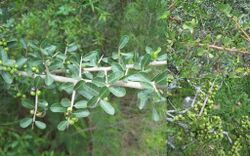Biology:Schinus engleri
| Schinus engleri | |
|---|---|

| |
| Scientific classification | |
| Kingdom: | Plantae |
| Clade: | Tracheophytes |
| Clade: | Angiosperms |
| Clade: | Eudicots |
| Clade: | Rosids |
| Order: | Sapindales |
| Family: | Anacardiaceae |
| Genus: | Schinus |
| Species: | S. engleri
|
| Binomial name | |
| Schinus engleri Barkley
| |
Schinus engleri is a species of plant in the family Anacardiaceae. It is found in Argentina , Brazil , and Uruguay. It is threatened by habitat loss. They are most abundantly found on the southern coast of Uruguay near Montevideo.[2] They are pepper trees that are important to Eucecidoses Minutanus to create galls on.[2][3]
Description
Schinus engleri is a plant that bears flowers and peppercorns that grows in a subtropical environment.[2] They have a green colored flowers are eudicots with five petals and five stamin. They also have compound leaves.[4] These plants only flower in Spring and Summer.[5] The S. Engleri is considered both a tree and shrub and stands about 3 meters tall (9.84 ft) flowers that are 1.5 mm long.[6]
Galls
Galls are growths that appear on the S. Engleri caused by the Eucecidoses Minutanus[3],[7] which is a part of the Cecidosidae, the monotrysian moth family.[8] The growths usually appear on the leaves, flowers, and roots.[9] Galls are used by the larva of the insect as protection while also inducing changes to the structure of the S. Engleri. The stem gall modifies the plants tissues in each developmental stage of the E. Minutanus.[7]
References
- ↑ Prado, D. (1998). "Schinus engleri". IUCN Red List of Threatened Species 1998: e.T34663A9876721. doi:10.2305/IUCN.UK.1998.RLTS.T34663A9876721.en. https://www.iucnredlist.org/species/34663/9876721. Retrieved 17 November 2021.
- ↑ 2.0 2.1 2.2 Grattarola, Florencia (2020-01-17). "Schinus engleri" (in en). https://www.inaturalist.org/observations/37684007.
- ↑ 3.0 3.1 Silva, Gabriela T.; San Blas, Germán; Peçanha, Willian T.; Moreira, Gilson R. P.; Gonçalves, Gislene L. (2018). "Phylogeography of the gall-inducing micromoth Eucecidoses minutanus Brèthes (Cecidosidae) reveals lineage diversification associated with the Neotropical Peripampasic Orogenic Arc". PLOS ONE 13 (8): e0201251. doi:10.1371/journal.pone.0201251. ISSN 1932-6203. PMID 30089137.
- ↑ "BOLD Systems: Taxonomy Browser - Schinus engleri {species}". https://v3.boldsystems.org/index.php/Taxbrowser_Taxonpage?taxid=775119.
- ↑ Diaz, Rozana. “Floral Food Resources for Apis Mellifera (Hymenoptera: Apidae) in a ...” Floral Food Resources for Apis Mellifera (Hymenoptera: Apidae) in a Mountain Forest Area in Uruguay, Universidad de la República, Facultad de Agronomía, Posgrado, Montevideo, Uruguay, 4 June 2021, www.researchgate.net/profile/Horacio-Heinzen/publication/352384177_Floral_food_resources_for_Apis_mellifera_Hymenoptera_Apidae_in_a_mountain_forest_area_in_Uruguay/links/60c7b9bc92851c8e6395bdbc/Floral-food-resources-for-Apis-mellifera-Hymenoptera-Apidae-in-a-mountain-forest-area-in-Uruguay.pdf.
- ↑ “The World Flora Online.” Schinus Engleri F.A.Barkley, worldfloraonline.org/taxon/wfo-0001246071;jsessionid=D37EE1C6E51878CCC52D9BC4FF1714F7#C. Accessed 3 December 2023.
- ↑ 7.0 7.1 Ferreira, Bruno G.; Moreira, Gilson R. P.; Carneiro, Renê G. S.; Isaias, Rosy M. S. (February 2022). "Complex meristematic activity induced by Eucecidoses minutanus on Schinus engleri turns shoots into galls" (in en). American Journal of Botany 109 (2): 209–225. doi:10.1002/ajb2.1798. ISSN 0002-9122. https://bsapubs.onlinelibrary.wiley.com/doi/10.1002/ajb2.1798.
- ↑ BURKS, R. A.; GIBSON, G. A.P.; LA SALLE, J. (2005-11-18). "Nomenclatural changes in Neotropical Eulophidae, Eupelmidae and Torymidae (Hymenoptera: Chalcidoidea) relating to parasitoids of Cecidoses eremita (Lepidoptera: Cecidosidae)". Zootaxa 1082 (1): 45. doi:10.11646/zootaxa.1082.1.4. ISSN 1175-5334. http://dx.doi.org/10.11646/zootaxa.1082.1.4.
- ↑ "Plant Galls" (in en-US). https://mortonarb.org/plant-and-protect/tree-plant-care/plant-care-resources/plant-galls/.
Wikidata ☰ Q5503253 entry
 |



